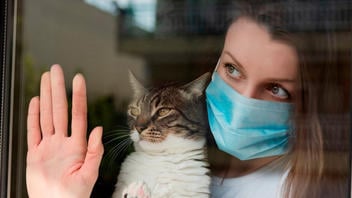
Did an emergency room doctor find that cat owners have a reduced chance of contracting COVID-19? No, that's not true: Dr. Sabina Olex-Condor, a doctor from Poland who lives in Spain, has a hypothesis this may be the case based on a small sample of COVID-19 patients she interviewed in the Madrid hospital where she works. No formal study has been conducted -- but some reporting on this has presented Dr. Olex-Condor's hypothesis as a medical fact. It is not.
The claim was reported in a video published by "Natural Cures" YouTube channel on July 17, 2020, titled "Cat Owners May Have Higher Immunity for COVID-19" (archived here) which opened:
Do you have a cat or dog at home?
Did you know that they can improve your immunity?
This is what Sabina Olex-Condor found out. She is an emergency physician in Madrid, and she made an amazing finding.
According to her, based on 100 patients infected by COVID-19, people who have dogs or cats can tolerate the new coronavirus more easily, or even completely asymptomatic.
Click below to watch the video on YouTube:
The video continued:
According to Sabina, cats can have the feline coronavirus that doesn't infect people. This way, it is possible that people who have close, daily contact with cats develop antibodies for the feline virus that can also destroy the human virus. Isn't it interesting?
She came to this conclusion after asking the infected patients if they had pets when orientating them as to how to proceed with isolation at home. At that moment, she realized that none of the people infected had cats. Some patients had dogs, but almost none of them had cats.
Although the research was small and without any statistics, Sabina will develop this study as soon as the situation improves, to have a wider number of interviews.
The "Natural Cures" YouTube channel is connected to a blog www.naturalcures.me and a website, www.findthecureinnature.com, where the video is included in an article (here)(archived here)
Complicating the way that Olex-Condor's hypothesis has been presented to the public is that it is frequently through translation and through the words of others. The doctor speaks only Polish and Spanish, and most of the reporting has been in other languages. When the story first made a splash on Facebook on March 25, 2020, it was a post (here)(archived here) by the director of the Poznań zoo, Ewa Zgrabczyńska, describing Olex-Condor's hypothesis. This screenshot of the post has been automatically translated by Facebook from the original Polish to English.
 The Polish website plus.gloswielkopolski.pl published an article on April 25, 2020 (here)(archived here). The article title, which takes the hypothesis a step further, translates to, "Dog and cat owners are more resistant to the coronavirus? According to a Spanish doctor, pets can increase immunity in humans." This article opened with the Facebook post by Ewa Zgrabczyńska and then featured an interview with Olex-Condor.
The Polish website plus.gloswielkopolski.pl published an article on April 25, 2020 (here)(archived here). The article title, which takes the hypothesis a step further, translates to, "Dog and cat owners are more resistant to the coronavirus? According to a Spanish doctor, pets can increase immunity in humans." This article opened with the Facebook post by Ewa Zgrabczyńska and then featured an interview with Olex-Condor.
The doctor was clear in the interview that this was a hypothesis, that she only spoke with a small sample of COVID-19 patients, and she stressed that more research would be needed. The headline boldly puts words in her mouth and announces a definitive statement which Dr. Olex-Condor does not appear to have made. Here are some translated quotes from this interview:
Cats are known to have their feline form of coronavirus that does not infect humans. It is therefore possible that people who come into close contact with their cat hosts on a daily basis may have antibodies to the feline virus. And these antibodies can destroy the human virus as well.
This is called a cross-reaction, and it exists in nature. Of course, in order to confirm my assumptions, in-depth research and conducted statistics would be needed.
Patients who go to hospital are also sometimes asked about their home situation. Among those who report to us, I have noticed that most of them do not have a pet at home .
I have found nothing about the coronavirus, this is just my hypothesis so far not supported by research .
The April 1, 2020, article in the Polish pet publication psy.pl (here)(archived here) switches the focus of the question to dogs. The article is titled, "Are dog handlers less likely to suffer from COVID-19? Amazing news!"
This article also begins by featuring the Facebook post of the zoo director, Ewa Zgrabczyńska, and does not interview Dr. Olex-Condor. Later in the article it is acknowledged that this is only a hypothesis, but the article opens by announcing this as "news," which could be confusing for many readers.
News from Madrid brought hope to all dog lovers. Dr. Sabina Olex-Condor observed that the symptoms associated with the coronavirus currently raging in the world were much less common in dog and cat carers. How much truth is there? Time will tell! However, it has been known for a long time that living with pets can build greater immunity.
On May 12, 2020, six Polish researchers published an article in the journal, "Medical Hypotheses" (here)(archived here) titled, "Do pets protect their owners in the COVID-19 era?" Olex-Condor's observation from the Spanish hospital is included in the article:
The empirical observations show that the presence of pets may have a positive impact on the course of COVID-19. Anecdotal evidence try to persuade that veterinary doctors are rarely affected with COVID-19. Doctor Sabina Olex-Condor, a Spanish physician in Madrid, suggested in an interview that the mild course is more frequent in patients owning pets (available at: www.vetnolimits.com; www.psy.pl; www.plus.gloswielkopolski.pl). The correlation between pet-ownership and the presence of a mild course of COVID-19 has not been found yet. In our study, we conducted a review of the literature, trying to establish a possible explanation to this observation. We suggest that the re-emerging contact with animal coronaviruses may lead to the stimulation of the immunological system, thus creating an effective response to SARS-CoV-2 infection.
The four items listed in the hypothesis article's conclusion name dog coronaviruses rather than cat:
CDC guidance, "COVID-19 and Animals" (here)(there are small differences in archived webpage between late April 2020 and July 2020) focuses on questions if human handlers and their pets might transmit the coronavirus to each other. The question of whether pet ownership in general might offer a protective effect to humans who come in contact with COVID-19 infected humans is not mentioned at all.
















